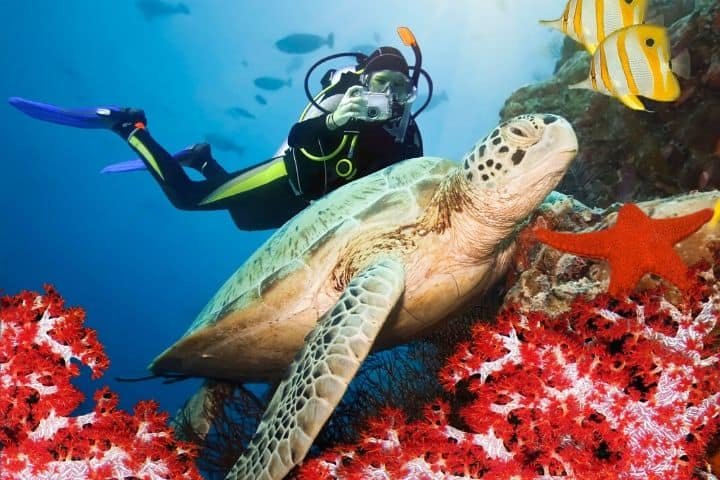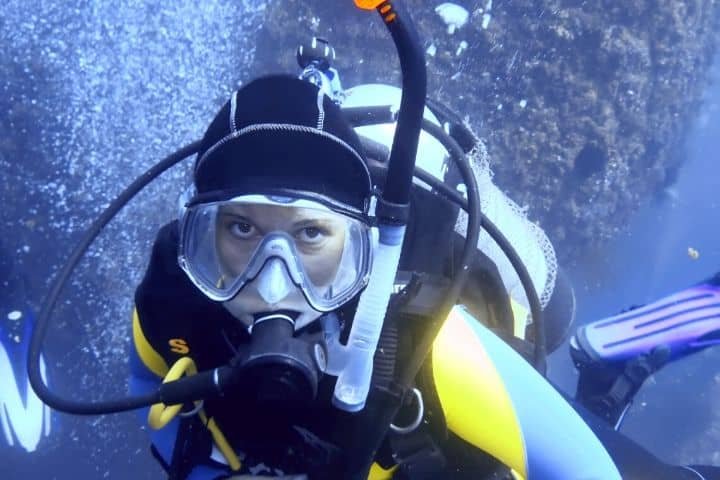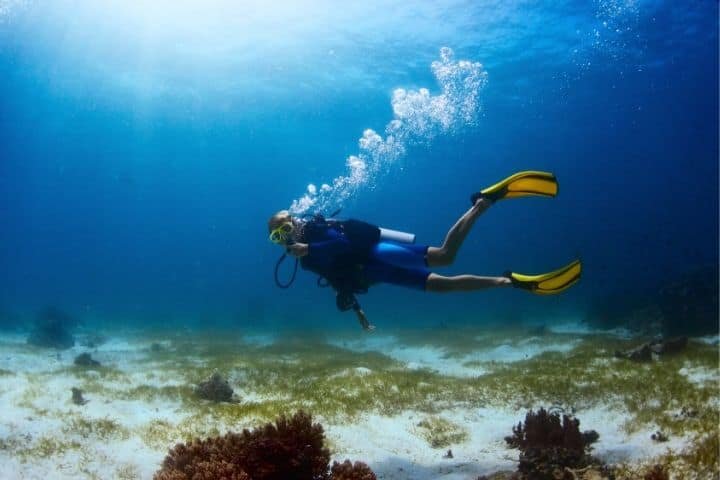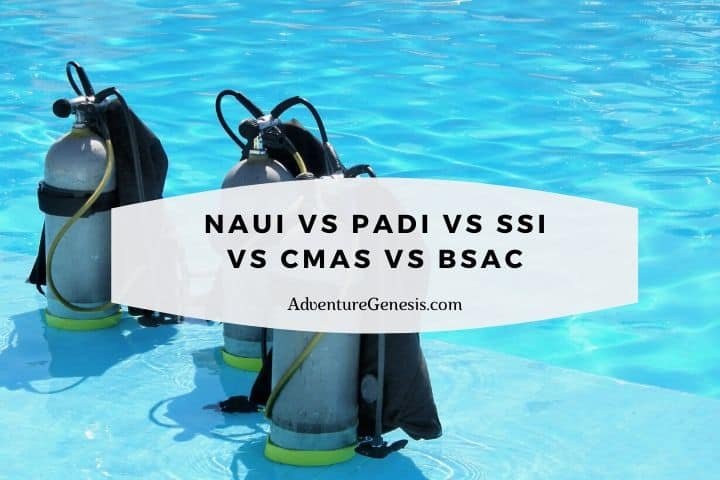You have decided to enter the world of underwater adventure, only to be faced with hundreds of diving agencies, all claiming to be the best. How are you meant to choose which dive certification is right for you? To help you pick, I have done extensive research between the three-best known dive certification agencies to give you an overview of what to expect.
So, what is the difference between NAUI, PADI and SSI certifications? For your entry-level dive course, all three of these options will give you a dive accreditation accepted worldwide. The starting level courses are almost identical, and each includes dive theory, confined and open water dives. You will only notice differences once you continue onto more advanced diver training. In this case, some agencies refuse to recognize each other’s qualifications.
However, as a beginner diver, you do not need to worry about that right now, as the initial first level training varies slightly between these diving super companies.
In this article, we will be looking at the agencies themselves, the beginner level diving courses, the costs, training requirements, and some of the pros and cons. I will also briefly mention the advanced courses each of these diving agencies offer and conclude by sharing with you the most important part of choosing a dive course.
PADI (Professional Association of Diving Instructors) Certification

PADI is based in the United States and is by far the biggest and most easily recognized agency in the world. PADI began in 1966 with a goal to improve the existing training protocols at the time. Those were difficult and complicated. The gear was expensive and, therefore, the marine environments were limited to a few people.
PADI wished to transform diving into a sport for anybody. They created their training systems that have now taken over the world. There are basic fitness and swimming tests followed by a theoretical section that includes a 50-question exam covering physics, equipment, physiology, and chemistry.
All of PADI’s courses are performance-based. This means instructors require all participants to demonstrate their ability to complete the necessary skills in the pool and the ocean. Once they have completed these skills, they receive their lifetime certification.
PADI prides itself on its 4 E philosophy. This encompasses education, experience, equipment, and environmental conservation. PADI believes the best way to learn is through experience, repetition, and getting practice in safe environments under the supervision of an instructor prior to going off in your buddy teams.
PADI encourages all its divers to learn about equipment, so they are better prepared when diving. It may happen that equipment being used in certain dive stores is leaking or showing similar problems. With PADI’s emphasis on getting to know your gear, they hope you can spot these issues before they escalate.
PADI has also created Project AWARE, which is a worldwide campaign focused on education and the protection of fragile underwater ecosystems. If you wish, you can donate to them through PADI or take a specialty course to learn more about marine conservation.
PADI Open Water Diver Course
The entry-level diving course offered by PADI is the Open Water Diver. This certification allows you to dive to a depth of 18 m unsupervised with a buddy.
The course itself includes 5 chapters of theory and 5 mini dives in a pool or confined water environment, followed by 4 open water dives. There are some places in the world that offer e-Learning as an alternative to the classroom and then squish the remaining practical skills into a two-day course.
If you have the choice, opt for the longer courses. A more conservative and comfortable option is a course that is spaced out over four days. A day for the dive theory, a day for the pool, and two dives on each of the two open water dive days.
Training Requirements
Before you are fully certified, you must complete theory, surface skills, and underwater skills.
The theory section is comprised of 5 chapters, each with its own knowledge review and quiz, finished off by an exam with a 75% correct required for a pass.
The surface skills include a 200 m swim, 10-minute treading water, tired diver tows, surface marker buoy deployment, and gear removal and replace.
Underwater you have 20 skills to complete, including clearing your mask, dealing with out of air situations, buddy breathing, controlled emergency swimming ascents, and buoyancy skills.
Cost
The baseline cost of the materials and certification is somewhere around the $120 mark, with dive companies piling their running costs on top. This means prices greatly vary depending on location. Typically, you should expect to spend anywhere between $400-$700 on this certification.
Pros
- Since PADI is the biggest diving certifying agency, you will be able to get certified anywhere in the world.
- The courses are quite easy and provide a quick entry into the underwater world.
- The cost of the dive course includes the cost of the dive materials.
- The PADI certification lasts forever; however, people are encouraged to do a refresher after an extended amount of inactivity (typically, 12 months).
- PADI talks about conservation in all their courses, as taking care of the ocean is a vital part of their company ethos.
Cons
- PADI has created courses in such a manner that almost anyone can do them. The certification requirements are quite basic, and divers aren’t 100% prepared to dive unsupervised. I would encourage you to consider doing the Advanced Open Water Course directly after your Open Water Course to build upon your skills, improve your navigation, and become a safer diver.
- PADI requires every diver to purchase a complete set of materials.
- The cost is typically higher than in other organizations.
- The structured course means there is very little flexibility in the order in which skills must be taught.
PADI Advanced Open Water Course
The Advanced Open Water Course includes a theory session corresponding to each of the 5 specialty dives. These include deep and underwater navigation, and three of your choice. With this certification, you can dive to 30 m and have a better understanding of the marine world.
PADI Rescue Diver Course
The Rescue Diver Course is comprised of several hours of theory, a multiple-choice exam, a pool session, and several in-water emergency scenarios. To complete this course, you need a minimum of 20 logged dives and a first-aid certificate.
PADI Master Scuba Diver Course
The divemaster course is the first level of professional diving. This means candidates learn about physics, equipment, physiology, and ocean currents. They also must demonstrate leadership skills and patience, and be able to successfully work with students. To become certified, you need a minimum of 60 logged dives, pass medical and fitness tests, and demonstrate your ability to guide.
PADI Open Water Scuba Instructor Course
The Open Water Scuba Instructor is the level at which you can begin to teach Open Water Courses. It includes a fortnight-long course and a two-day exam covering all components. The prerequisites include medical exams, a first-aid instructor certificate, an oxygen provider course, 100 logged dives, and for you to be at least 18 years of age.
NAUI (National Association of Underwater Instructors) Certification

The National Association of Underwater Instructors prides itself on its high standards in both recreational and technical diving. It has gathered a global reputation for having excellent training and educational materials dedicated to making safe divers.
NAUI continues to work on developing new technologies and theories, which places them at the top in the technical diving field.
If you are ever interested in getting into technical diving, having a NAUI background could be ideal for you. Technical diving includes diving deeper than 40 m, penetration wreck diving, cave diving, and mixing gases.
Fun fact: Captain Jacques-Yves Cousteau sat on NAUI’s first board of directors.
NAUI Scuba Diver Course
The entry-level diving course greatly depends on the attitude of the instructor. NAUI does not have rigid academic outlines. Instead, they allow flexibility in the program for the instructors to tailor the course to your needs.
The NAUI instructors may exceed baseline standards in ways that do not jeopardize student safety. This can include additional academic content or more Open Water Dives than the four that are required.
The entry-level certification is the NAUI Scuba Diver. Here you learn about modern diving equipment, diving science, responsible diving practices, and the environment. The diving skills are first practiced in a confined water environment followed by open water training.
Once all skills are completed to your instructor’s satisfaction, you are certified to a depth of 20 m.
Cost
The cost of the dive courses varies depending on location, duration, instructor, facilities, and benefits. There is no standardized cost.
Pros
- This diving program gives a lot of freedom to the scuba diving instructors and depends on their discretion for teaching students. Unlike PADI, which is performance-based, NAUI instructors have the right to withhold certification if they do not believe the diver is ready.
- The instructors are encouraged to tailor courses to students and can implement extensive theory and additional open water dives.
- NAUI also requires a skin dive in their scuba course, therefore has a better overview of a diver’s swimming level.
- Since NAUI focuses greatly on technical diving, any students who have been taught by NAUI in recreational already get a glimpse into the more advanced diving world.
Cons
- While the certification is recognized worldwide, it is less known than PADI, and fewer locations teach it.
NAUI Advanced Scuba Diver Course
The Advanced Scuba Diver includes a minimum of 6 open water dives, including separate dives for navigation, night and low visibility, and deep diving to 40 m of depth. You can choose the additional 3 dive types, ranging from altitude diving, hunting and collecting, shore diving, etc.
NAUI Rescue Scuba Diver Course
The Rescue Scuba Diver requires prerequisites of CPR and First Aid. You will learn to manage risks, handle in-water programs and dive emergencies.
NAUI Master Scuba Diver Course
The Master Scuba Diver includes a minimum of 8 open water dives with the requirements of emergency procedures and rescue, deep/simulated decompression diving, limited visibility or night diving, and underwater navigation. The additional dives include skin diving, environmental survey, air consumption, or boat diving.
SSI (Scuba Schools International) Certification

Scuba Schools International is a retail-based organization that is focused on freediving, snorkeling, swimming, and scuba diving. SSI is a well-known certification agency famous for high standards and trust in their instructors.
Unlike PADI, SSI instructors must be affiliated with a physical store to be able to train. SSI is represented in over 110 countries with 2800 international locations. They operate with a strong emphasis on knowledge, skills, equipment, and experience. They provide both recreational and technical diver training.
- Knowledge: SSI believes that learning scuba diving information allows their students to be safe divers.
- Skills: An additional focus is put on the repetition of skills to ensure they come as second nature when diving underwater.
- Equipment: understanding equipment is a vital part of scuba diving, to respect the kit and ensure safe diving.
- Experience: is a key part of the training, and SSI encourages students to complete more than the minimum number of required dives prior to certification.
SSI Open Water Diver Course
The SSI Open Water Diver requires people to be a minimum of 10 years old and have a signed medical history form.
The recommended course duration is 16-32 hours. It includes a theoretical section, followed by pool sessions with a ratio of 8 divers to 1 instructor, followed by four open water dives. The pool session is focused on skill repetition to allow students to get familiar with the movements to make them second nature. There is also an exam which you need to achieve a minimum of 80%.
After the completion of the open water course, you are allowed to dive to a depth of 18 m.
Cost
Just like the other certification agencies, the price of the course greatly depends on the location and facilities of the dive shops. Costs can once again range from 300-700$ for the certification. The theoretical component can be learned online, and this part of the training is free.
Pros
- SSI instructors are affiliated with a physical store ensuring they have high standards.
- There is an 80-20 rule, with 80% of the course structured according to SSI, and 20% up to the discretion of the instructor. This means the order of the skills can be adjusted to fit the needs of the student.
- The online theoretical part of the training is free.
- Skills are taught through repetition in the pool session, and instructors take their time to make the students comfortable.
- SSI tends to be cheaper than other dive courses and does not require you to purchase the theoretical manual.
- The certification card will be given to you at the end of your course, eliminating the need to wait for it in the mail.
Cons
- SSI is not available everywhere in the world, so if you do wish to gain this certification, you will have to do your research to find a dive shop.
SSI Advanced Adventure Water Diver Course
The Advanced Adventure Diver is comprised of five different specialty dives and certifies you to a depth of 30 m. This can incorporate nitrox, buoyancy, night diving, and more.
SSI Dive Guide Course
Dive Guide is the next step in the SSI diving ladder and its first level of professional diving. The prerequisites include 40 logged dives and a minimum age of 18 years.
Other Certification Agencies (CMAS & BSAC)
Now that you are familiar with the three most prominent training agencies, I wanted to include a few honorable mentions. These include CMAS, which is one of the training authorities in the dive industry, and BSAC, the British Sub Aqua Club.
CMAS (World Underwater Federation) Certification
The CMAS diver training systems include international frameworks for diver and instructor qualifications in scuba diving. In 1958, delegates from many countries gathered to create an international confederation for all underwater disciplines.
Pros
- The level one CMAS generally produces more competent and confident divers than other certifying agencies. This is because their training goes beyond the requirements defined by the Autonomous Diver Standard.
- The beginner level certification allows you to dive to a depth of 20 m.
- The starting level includes 5 open water dives, giving you an extra dive to hone your skills.
Cons
- CMAS certification is less known worldwide, so it is recommended to bring your logbook onto the dive boat to verify your experience.
- You need to be careful what CMAS certification you choose as some only allow you to dive if accompanied by an instructor or dive leader.
BSAC (British Sub Aqua Club) Certification
BSAC is a UK based aqua club that boasts more rigorous qualifications and a sense of community. BSAC is first and foremost a club, where the members meet up to dive and socialize on a regular basis.
The courses offered by BSAC tend to be cheaper but longer than other companies. This is because BSAC depends on a club network with the courses taught by volunteers. BSAC members often do not see eye to eye with other certification agencies as they view themselves as guardians of pure diving. They focus on doing things in a safe and proper way, prioritizing community, knowledge, and teaching, rather than certification numbers.
Joining BSAC gives you membership benefits, including liability insurance cover, year-round diving and training opportunities, and deals to save hundreds of pounds on dive kit and travel.
Cost
The cost of the Ocean Diver qualification (which equates to PADI Open Water Diver) is around $330, which includes a one-year membership of BSAC. It also includes at least 5 open water dives.
If you plan to dive regularly in the UK, being a BSAC member allows you cheaper dives at around $20 after paying the yearly membership of $70.
Pros
- BSAC is a club and creates a sense of community and comradery amongst its members.
- The courses are taught by dedicated members and volunteers who prioritize learning over the number of certified students.
- Once a member in the UK, you get access to cheap diving and social opportunities to meet likeminded people.
- The course is cheaper and longer, allowing you to be better prepared for the real world.
- The certification is accepted worldwide.
Cons
- For people in a hurry, the longer course might not be the best option for you.
- If you are interested in becoming a professional, BSAC teaching would be for the love of diving rather than any monetary gain.
NAUI vs PADI vs SSI vs CMAS vs BSAC: Differences Between Diving Certifications

Now that you have an overview of some of the most popular certification agencies in the world, you may have a better idea of which one you would pick. Keep in mind that the beginner level courses are extremely similar for all the certification agencies, and the content begins to diverge once you reach advanced training.
If you are interested in getting your certification fast, then PADI is the best choice for you. PADI offers the easiest course with a certification recognized anywhere in the world. This certification is ideal for tropical water diving, dive holidays with the family, and a quick introduction to the underwater world. If you want to stay a recreational diver, I would recommend sticking to PADI.
If you prioritize old school principles where the course is specifically tailored to your learning style, NAUI and their instructors would be the ideal option for you. The first level of certification will already allow you to dive to a depth of 20 m (in comparison to PADI’s 18 m).
Considering that NAUI is a leader in technical diving, getting your recreational training with them could ease your transition. So if you are interested in expanding your skills into technical diving, whether this is to dive deeper, swim inside a wreck or cave, then chose NAUI!
If you prefer an instructor who is associated with a shop but receives a level of flexibility to adjust the course’s skill order according to your performance, SSI should be your top pick! Their instructors are held responsible by their place of work, and SSI trusts them to teach in a manner to create the safest certified divers possible.
CMAS, on the other hand, can be considered the grandfather of diving, creating the training requirements and producing high-quality level divers. If you prefer this purist diving approach, CMAS would certainly love to have you on board.
If you live in the UK and are looking for dive buddies along with friends, then the BSAC would be your home. They focus on a sense of community, organize trips together, and teach and learn from each other. Here, your instructor would be a volunteer and would be teaching out of love for the sport rather than a paycheck waiting in the mail.
Related Questions
Are all certifications accepted worldwide?
Whichever one you chose, keep in mind all these certifications are accepted worldwide! DO NOT fall for a trap for a smaller certifying agency, which might seem ideal due to its small initial cost. There have been instances where students paid for a ‘course’ which was not accredited, and they were not allowed to dive.
Does NAUI certification expire?
Once you obtain your PADI certification, it never expires. However, it is a good idea to enroll yourself in a refresher to update your skills after a period of inactivity. Typically, people will recommend jumping into a pool for a quick refresher after a year without diving. NAUI, SSI, and CMAS also provide certifications that are good for life.
Do you need a diving certification to dive?
If you do not know if you want to commit to a full course, you might want to attempt a try dive first. Most agencies offer try dives in which you are fully supervised by an instructor. They will cover some basic theory and get you to practice simple skills before taking you on a short exploration. However, if you wish to dive without an instructor, you must go through the entire course. This is to ensure yours and your buddies’ safety.
Related article: Is Scuba Diving Illegal Without Certification
Does PADI recognize SSI and NAUI?
At the beginning levels, these three agencies recognize each other’s certifications. If you wish to continue your diving education in a different system, you can usually transition with minimal hassle.

